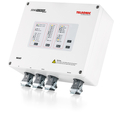-
Oct 8, 2017
A universal cutting process for lightweight construction
 As a pioneer in ultrasonic technology, Telsonic AG has been developing and selling production-ready ultrasonic cutting systems, which have already proven their worth in practical applications in fields such as automotive engineering, aviation, body construction, machine building, packaging, textiles and the consumer goods industry.
As a pioneer in ultrasonic technology, Telsonic AG has been developing and selling production-ready ultrasonic cutting systems, which have already proven their worth in practical applications in fields such as automotive engineering, aviation, body construction, machine building, packaging, textiles and the consumer goods industry.
++ more
-
Oct 6, 2017
Equiplast Barcelona: Telsonic at the International Plastics and Rubber Event
 Equiplast is one of the foremost trade shows in the field of plastics manufacturing. The event proved a fascinating experience for Telsonic in every respect.
Equiplast is one of the foremost trade shows in the field of plastics manufacturing. The event proved a fascinating experience for Telsonic in every respect.
++ more
-
Sep 13, 2017
The Battery Show USA: Telsonic ultrasonic expertise in battery production
 At Battery Show in Novi, Telsonic offers solutions from powder screening to contact welding.
At Battery Show in Novi, Telsonic offers solutions from powder screening to contact welding.
++ more
-
Jul 27, 2017
Our website is now SSL-encrypted
 The security of your data is important to us. For that reason we secure the transfer of your data with a certified SSL encryption.
The security of your data is important to us. For that reason we secure the transfer of your data with a certified SSL encryption.
++ more
-
Jul 20, 2017
Market introduction of “New SG47 screen generator in the SONOSCREEN®plus range”
 The SG47 replaces the proven SG46 and has been updated to the latest technical level in many respects.
The SG47 replaces the proven SG46 and has been updated to the latest technical level in many respects.
++ more
-
Jun 23, 2017
Packing pasta with ultrasonics
 Spaghetti is typically packed in horizontal packaging machines. It is becoming ever more common for pasta to be cut into equal lengths and pre-proportioned with ultrasonic sonotrodes after it has been dried. In the next process step it arrives on a conveyor belt and is packed in a tubular bag.
Spaghetti is typically packed in horizontal packaging machines. It is becoming ever more common for pasta to be cut into equal lengths and pre-proportioned with ultrasonic sonotrodes after it has been dried. In the next process step it arrives on a conveyor belt and is packed in a tubular bag.
++ more
 As a pioneer in ultrasonic technology, Telsonic AG has been developing and selling production-ready ultrasonic cutting systems, which have already proven their worth in practical applications in fields such as automotive engineering, aviation, body construction, machine building, packaging, textiles and the consumer goods industry.
As a pioneer in ultrasonic technology, Telsonic AG has been developing and selling production-ready ultrasonic cutting systems, which have already proven their worth in practical applications in fields such as automotive engineering, aviation, body construction, machine building, packaging, textiles and the consumer goods industry. Equiplast is one of the foremost trade shows in the field of plastics manufacturing. The event proved a fascinating experience for Telsonic in every respect.
Equiplast is one of the foremost trade shows in the field of plastics manufacturing. The event proved a fascinating experience for Telsonic in every respect. At Battery Show in Novi, Telsonic offers solutions from powder screening to contact welding.
At Battery Show in Novi, Telsonic offers solutions from powder screening to contact welding. The security of your data is important to us. For that reason we secure the transfer of your data with a certified SSL encryption.
The security of your data is important to us. For that reason we secure the transfer of your data with a certified SSL encryption. The SG47 replaces the proven SG46 and has been updated to the latest technical level in many respects.
The SG47 replaces the proven SG46 and has been updated to the latest technical level in many respects. Spaghetti is typically packed in horizontal packaging machines. It is becoming ever more common for pasta to be cut into equal lengths and pre-proportioned with ultrasonic sonotrodes after it has been dried. In the next process step it arrives on a conveyor belt and is packed in a tubular bag.
Spaghetti is typically packed in horizontal packaging machines. It is becoming ever more common for pasta to be cut into equal lengths and pre-proportioned with ultrasonic sonotrodes after it has been dried. In the next process step it arrives on a conveyor belt and is packed in a tubular bag.
